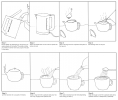Im not sure that help in making a cup of tea is the best thing to focus on. Mum could make a cup of tea when she could no longer do any other sort of cooking (including microwaving a ready meal), no longer understood how to work her TV and her digital photo frame that was all set up and just needed plugging in remained in its box.
The sort of technology that you are thinking about could be used by someone in the early stages of dementia, but unfortunately they tend to be very resistant to change, because change means learning new things and this is what they are having trouble with. Therefore they cling to the old ways because they are already learned (right up until the time that they are forgotten) - even if the new ways would make life easier.
The sort of technology that you are thinking about could be used by someone in the early stages of dementia, but unfortunately they tend to be very resistant to change, because change means learning new things and this is what they are having trouble with. Therefore they cling to the old ways because they are already learned (right up until the time that they are forgotten) - even if the new ways would make life easier.

